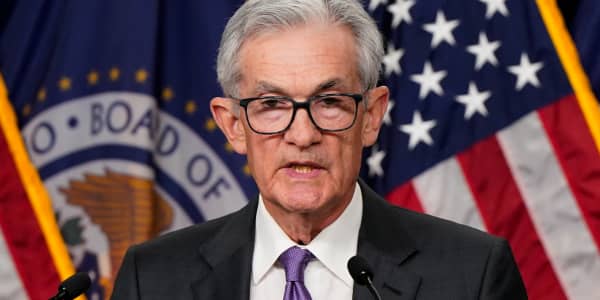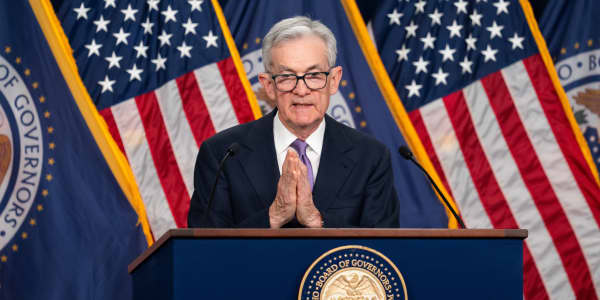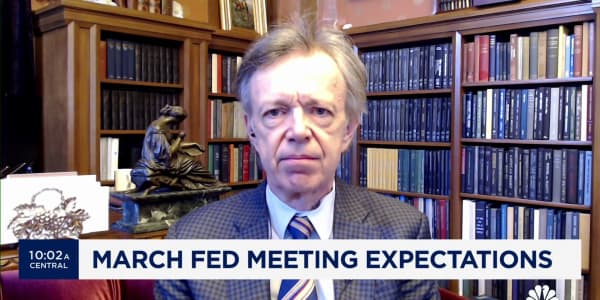
Wall Street is looking for lower inflation and stronger growth from the plunge in oil prices but the CNBC Fed Survey shows it still sees the Federal Reserve on track raise interest rates this summer for the first time in eight years.
Instead of seeing the Fed putting off rate hikes because of lower inflation, respondents forecast a gentler rate hike cycle. The average liftoff month remains July 2015 but the estimate for the fed funds rate declined in 2015 to 0.83 basis points, down 6 bps, and 2016 to 1.93, down 11 bps.
The 38 respondents, who include economists, strategists and fund managers, also lowered by 10 bps their estimate of where the Fed would stop hiking interest rates. The so-called terminal rate is now forecast to be 3.2 percent, and the market now sees the Fed hitting that rate in the first quarter of 2018, a quarter later than the previous survey.
Read MoreJanet Yellen, the most important person in DC in 2015
"With inflation low and wage growth weak, the Fed can afford to be patient. A pickup in wage growth in 2015 won't likely change matters, either," wrote Pimco's Tony Crescenzi, suggesting the central bank would tolerate the economy running "slightly hot."
The results suggest that the market senses a commitment by the Fed to begin raising interest rates next year. But changes to the outlook, such as weaker or strong growth, are seen altering the speed of those rate hikes.
"The U.S. economy looks terrific and a challenge for the Federal Reserve will be how to balance the achievement of full employment but not price stability in choosing the path for the federal funds rate," said Allen Sinai of Decision Economics.
Read MoreWall Street sees Fed hike sooner: CNBC survey
Still, the averages mask a strong debate in the market over the right course for policy next year, with some saying the Fed needs to focus on deflationary concern and others better growth and possible inflation.
"Growth momentum is much stronger than commonly appreciated and more than enough to continue pushing the unemployment rate down," Neil Dutta, Renaissance Macro Research, responded to the survey. "A forward-looking Fed will do what it always has done ... lift rates to anchor business and household inflation expectations."
But John Kattar of Ardent Asset Advisors believes: "The Fed needs to be more focused on the deflationary risk of collapsing oil prices and a surging dollar than on the better employment numbers now. At the margin, I think this makes them more dovish."
The decline in oil is viewed as a positive for the U.S. economy. First-quarter growth is estimated to be about 40 bps higher as a result of the plunge in crude and inflation about 30 bps lower. For the full year, the U.S. economy is forecast to grow 3 percent, a bit better than previously estimated, and 2016 growth is seen at 2.9 percent.

PNC Chief Economist Stu Hoffman said that since previous price hikes have caused recessions, the reverse should propel growth. He called the price drop "a BIG net win for the U.S. economy."
The combination of lower oil prices and better growth could help explain why the chance of recession in the next year hit an all-time low in the survey of just 13.6 percent. The previous low was 14.6 percent in April.
Equities also are seen benefiting with respondents on average forecasting 9 percent stock market gains over the next year and 15 percent over the next two years. But the chance of a 10 percent market correction in the next three months is put at nearly 45 percent. Wall Street has slashed its outlook for Treasury yields, seeing the 10-year bond remaining below 3 percent through the end of 2015, 50 bps less than forecast in the summer.
Read MoreMarket pushes back Fed rate hike expectations: Survey
Expectations for lower bond yields come with inflation forecast to run below the Fed's 2 percent target until 2016. Next year, the headline U.S. consumer price index is forecast to rise just 1.74 percent, a quarter point below the estimate in the previous survey.
European economic weakness is now seen as the No. 1 threat to the U.S. economic expansion, eclipsing the prior top concern of tax and regulatory policy. But respondents see the European Central Bank taking action, with 78 percent believing the ECB will launch outright quantitative easing in February 2015.
"The risks we see lie in European weakness and geopolitical tensions with the upside potential driven by better Asian growth, including Japan, developing from late 2015," said Subodh Kumar, of Subodh Kumar & Associates.





